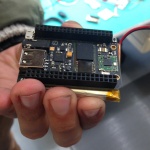Google has posted the schedule for Google I/O 2015. While the company tries not to give away too many things with the early schedule, the release always ends up being full of new information. We dug into all the session descriptions, and here's all the info we could squeeze out of it.
Android M—It looks like Android M, the next version of Android, will be at the show. One sandbox session is called "Android for Work Update" and says, "Android M is bringing the power of Android to all kinds of workplaces." While full Android releases have alphabetical snack code names, "Android L" launched last year at Google I/O, and the release was a developer preview for what would eventually become Lollipop. So it sounds like Android [letter] is a new pattern that indicates a dev preview.

It looks like Google inadvertently spilled the beans on this one, as the session is now removed. We saved a screenshot, though.
An Android for Work update—See above. We looked at Android for Work earlier this year. The feature is a dual-persona solution that gives a user two versions of an app—one for work data and one for personal data—and keeps everything separate. Somehow the new Android for Work update will "bring Android to all kinds of workplaces." The current implementation doesn't work for high-security businesses, so we're guessing that Android M and the new version of Work combine for even more app separation.
Google Cloud Messaging 3.0—A new version of Google's push messaging platform. We're really not sure what Google could add or improve. Ideas?
Voice Access—A session called "Your app, now available hands-free" says, "In this talk, we introduce Voice Access, a service that gives anyone access to their Android device through voice alone." The two presenters have a background in accessibility, but it sounds like the feature would be useful for things like driving, too. Being able to access an entire app through voice would mean a ton of extra voice commands.
Real-time satellite imaging of Earth—Google bought satellite imaging company Skybox last year for $500 million. Skybox planned to launch 24 image satellites into space by 2018, but that was before Google got involved and probably accelerated that timeline. A session called "The Earth in real time" offers "a look under the hood at Skybox to find out what we're building for your business and get a preview of a new breed of dataset."
Multi-screen Chromecast games = Chromecast 2?—A session called "Designing games for Google Cast" will discuss "designing for the mobile and television experience on multiple screens, and adapting existing game design patterns to a multi-screen interactive format." Another session talks about "using Android and iOS mobile devices as game controllers to unleash new interaction models for Chromecast and other Cast devices." Games on Google Cast in itself sounds rather new, but we remember a Gigaom interview with a Google exec saying that a second version of the Chromecast was in development and that “the hardware capabilities will give us a better opportunity to take full advantage of a large screen paired with a small screen.” All of this multi-screen talk makes it sound like the Chromecast 2 will be launching at the show.
ATAP is still crazy and making a wearable—ATAP, Google's Advanced Technologies and Products group modeled after DARPA, will have some kind of wearable at the show. Google says it will discuss "wearables that we hope will blow your socks off. (We mean this more literally than you might think…)." The goal of the project is to "break the tension between the ever-shrinking screen sizes necessary to make electronics wearable and our ability to have rich interactions with them." The group previously birthed Project Tango, a phone and tablet with Kinect-style 3D-sensors, and Project Ara, an upcoming modular smartphone system, and has demoed even crazier ideas like an electronic tattoo that could authenticate a smartphone login.
Polymer 1.0—Polymer is Google's UI toolkit for making websites with an app feel. Google has a demo of material design-style UI widgets smoothly animating in a browser that work just like they do in Android. Polymer is up to version 0.8 right now, but according to a session titled "Hands-on with Polymer 1.0," the release version will be launching at I/O. Google promised a material design revamp of all of its Web properties last year that mostly hasn't materialized, but maybe it was waiting for Polymer to be finished. Another talk called "Polymer and modern web APIs: In production at Google scale" seems to support this, saying, "Learn how teams at Google have successfully launched on google.com using Polymer and the latest platform APIs: Web Animations, Service Workers for offline and push notifications, and material design."
Besides the big standouts, there are also a lot of talks related to testing Android apps, perhaps indicating that some new tools will be released. Google is still on its virtual reality kick as well, trying to turn Android into a VR gaming platform with Google Cardboard (and competing with/complementing Samsung's Gear VR). There are also lots of talks about material design, which will turn one year old at the show.
I/O promises to be a huge show this year (there's also a 2.5 hour keynote) and we'll be there to cover it all. The show starts May 28.


